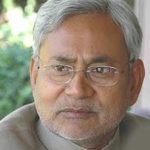
Nitish Kumar may be changing Indian politics
A spate of corruption scandals in recent weeks has left the reputation of India’s state institutions – never particularly high to begin with – even further dented. My blogging colleague Manasi Kakatkar-Kulkarni has detailed the most prominent of these alleged derelictions. Subsequent to her post has come news of a bribes-for-loan scam that has resulted in the arrest of senior executives of several state-run financial institutions. The Supreme Court, one of the country’s most respected institutions, has also raised concerns about the probity of the head of the Central Vigilance Commission, the country’s anti-corruption watchdog agency.
All of these developments sharpen the Indian public’s deeply-engrained cynicism regarding the integrity of their public institutions. And they have caused some observers to doubt whether the country’s high-flying economic trajectory is sustainable. Arguing that “there is no truly prosperous country without a stable well-functioning government,” a commentator on the New York Times Economix blog declares that “India needs political change for us to be confident that its economic growth will continue.”
Amid all the hand-wringing over the scandals, however, glimmers of political change may have shone forth last week from what until a few years ago was the most unlikely of places. The coalition government headed by Chief Minister Nitish Kumar was overwhelmingly elected to a second term in the eastern state of Bihar, one of the largest states in India. The event has national significance on several counts.
Not too long ago, Bihar was considered the most backward of India’s 28 states – the epitome in fact of everything that is wrong with the country: oppressive poverty, widespread anarchy, government malfeasance, and divisive caste-based politics. Indeed, a New York Times article earlier this year notes that Bihar was for decades “something between a punch line and a cautionary tale, the exact opposite of the high-tech, rapidly growing, rising global power India has sought to become.”
From 1990-2005, the state government was lead by the husband-wife combo of Lalu Prasad Yadav and Rabri Devi, who were focused less on the common good than on rewarding the long-marginalized lower caste groups and Muslims comprising their political base. This approach to governance left Bihar in shambles. Economic growth was anemic, and sometimes even negative; governmental services, including education, decayed; public infrastructure fell into disrepair; and criminal gangs operated with impunity. The corruption-riddled state administration became known as the “Jungle Raj.” Edward Luce, formerly the South Asia bureau chief for the Financial Times, writes in his recent book that the state capital of Patna, a city of three million people, was so delapidated in those days that not a single traffic light functioned.
Since assuming office in late 2005, Kumar has managed a remarkable turnaround of the state’s fortunes. He forcefully cracked down on the criminal syndicates; undertook an energetic program of road and bridge construction; improved the delivery of education and health services; and fostered the political empowerment of women. To be sure, Bihar remains impoverished, but it is also now one of the country’s fastest-growing regions. Rather than appealing to narrow sectarian interests, Kumar campaigned on the shared benefits that come from development and good government, and his re-election bid received widespread support across ethnic, religious and gender lines.
Kumar’s return to office has ramifications for the national political landscape far beyond the current mentioning of his name as a future prime minister. His coalition partner, the Bharatiya Janata (“Indian Peoples”) Party, also picked up impressive electoral gains. At the national level, the BJP forms the core of the parliamentary opposition to the government of Prime Minister Manmohan Singh. Singh’s own re-election 18 months ago left the BJP in disarray. But with its new success in Bihar – and with Singh’s government weakened by the corruption scandals; indeed, his resignation cannot be ruled out – the party’s national prospects have been revived.
More fundamentally, Kumar’s re-election may signal that the parlous grip of identity-based politics is waning. Caste-based parties and their distributional politics have done much to hold back India’s progress over the past two decades. The ascendance of broader political groupings focused on good governance would be a most salutary development.
One commentator argues that “Kumar has raised the bar for almost every other chief minister in the country.” But whether the “Kumar effect” has any resonance outside of Bihar will be put to the test in the neighboring state of Uttar Pradesh, India’s most populous state, whose government is currently lead by Mayawati Kumari, notorious for her manipulation of sectarian interests. The BJP plans to highlight the Bihar approach in its campaign against Mayawati in the mid-2012 state legislative elections. Their outcome will have much to say about the trajectory of India’s future.